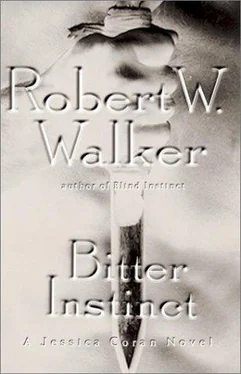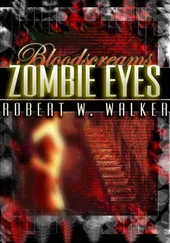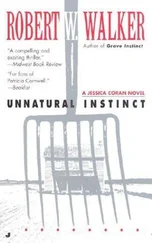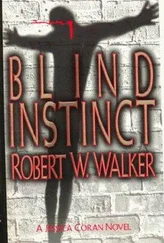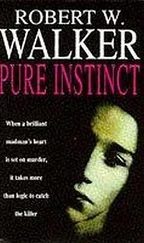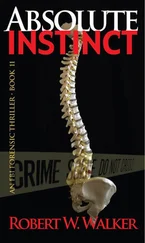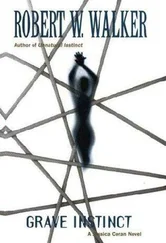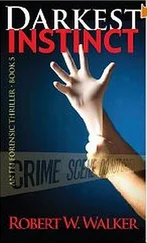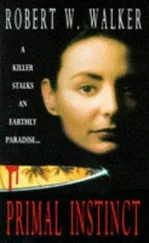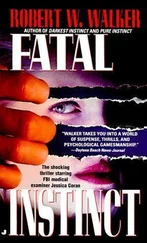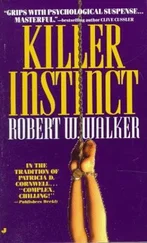Robert Walker - Bitter Instinct
Здесь есть возможность читать онлайн «Robert Walker - Bitter Instinct» весь текст электронной книги совершенно бесплатно (целиком полную версию без сокращений). В некоторых случаях можно слушать аудио, скачать через торрент в формате fb2 и присутствует краткое содержание. Жанр: Полицейский детектив, на английском языке. Описание произведения, (предисловие) а так же отзывы посетителей доступны на портале библиотеки ЛибКат.
- Название:Bitter Instinct
- Автор:
- Жанр:
- Год:неизвестен
- ISBN:нет данных
- Рейтинг книги:3 / 5. Голосов: 1
-
Избранное:Добавить в избранное
- Отзывы:
-
Ваша оценка:
- 60
- 1
- 2
- 3
- 4
- 5
Bitter Instinct: краткое содержание, описание и аннотация
Предлагаем к чтению аннотацию, описание, краткое содержание или предисловие (зависит от того, что написал сам автор книги «Bitter Instinct»). Если вы не нашли необходимую информацию о книге — напишите в комментариях, мы постараемся отыскать её.
Bitter Instinct — читать онлайн бесплатно полную книгу (весь текст) целиком
Ниже представлен текст книги, разбитый по страницам. Система сохранения места последней прочитанной страницы, позволяет с удобством читать онлайн бесплатно книгу «Bitter Instinct», без необходимости каждый раз заново искать на чём Вы остановились. Поставьте закладку, и сможете в любой момент перейти на страницу, на которой закончили чтение.
Интервал:
Закладка:
Robert W. Walker
Bitter Instinct
PROLOGUE
… every action is preceded by an impulse, and man is not so private a being that his behavior is unseen, his patterns undetectable.
— Gavin De BeckerScrawled in careful longhand in a reddish ochre color across and down Anton Pierre's thin, bony back, an exquisite living poem ripples with his movement. And the movement speaks. It speaks the poem into existence as it crawls, glides, moving with his lithe body. At first, snakelike, the poem slithers with his groaning. Soon, however, it seems to assume an angelic flight with Anton's lilting gasp for breath.
It is a poem penned with a needle-pointed, flesh-cutting quill. The poem's ink, laced with the toxic concoction, runs into Anton's bloodstream, the poison doing its work. Anton Pierre believes both poem and poet inspired, and, in fact, he'd earlier jokingly called his killer the Lord Poet of Misspent Time. They had toasted to the name, and the poet thought it appropriate, replying, “Yes, Lord Poet Messenger of Misspent Time, I would add. That's what I'll call myself.” They shared a laugh then and they drank to each other's boldness, Anton's in baring his body, the poet in baring his soul.
Anton had been searching for a sponsoring poet, someone whose work he could respect. He had found his poet, or rather his poet had found him; either way, results had come about, results without regret.
“Perhaps you are what you claim to be, the reincarnated soul of all the great poets,” Anton Pierre had said to the poet on reading some lines the other had dashed off as if it were no more difficult to compose poetry than to breathe in the moonlit air. “You have the flare of a classical poet, but your subjects are abjectly modern, dark, and melancholy.”
“I'll take that bit of critical analysis as a compliment,” the poet had said, toasting again. “Dear boy, you must know that melancholia sells, and it is precisely that which my poetry is meant to evoke.”
Now Anton feels a sense of pride fill him at being chosen, that he will stand before the coffeehouse masses to bare himself so that others might read him: literally read his living poem from his back side. His Lord Poet of Misspent Time promises this opportunity, saying, “These words and your body, Anton, will reach the minds and souls of everyone tonight-all the world's a stage, right? And the poem inspired by you? It shall be repeated throughout time.”
Inside Anton Pierre's head a silver rainshower of uncontrollable and musty images now swirl. A desperate euphoria engulfs him. An overwhelming and hungry sensation of warmth and happiness crawls along the corridors of his mind, curls up catlike, and replaces any sense of pride or feelings of self, for he no longer comprehends the self. The self has been washed away by a peaceful serenity invading his brain. This paradoxically gentle tidal wave ends all limitations and boundaries of self, of time, of place, and of will. The next to choose dies on the vine, replaced by innocent ignorance of his own demise-on this plane. Works like a charm-keeps all thoughts pure and unencumbered. He feels no melancholy, no bitterness, only a sense of loss just out of reach, running ahead… shadowlike, just out of his grasp, like a butterfly being.
Perhaps if he had understood the deeper meanings of the poem that he'd allowed to be etched into his back, then perhaps he would know the intent of the Lord Poet Messenger of Misspent Time, as the other had begun to think of himself. Meantime, in Anton's inner ear, whispered words travel the shell-like coils, but these words can't make themselves clear; the auditory sense has been disengaged along with all other senses.
“Aaaaway-ken-to-aware-wareness… place of angels,” were the last words to solidify in Anton's brain.
Inside the killer's head, a sense of accomplishment rises, dragonfly-like and divine. The mission has been accomplished. No lack of sensation here inside the poet's mind, for it is filled with the words, sights, sounds, and odors of this moment, soothing the angelic Anton into calm acceptance of the death and the rebirth he so deserves; he soothes Anton with assurances, contentment, and serenity, and what the final serenity promises. Now sending forth a gift to the pleading heavens, the poet knows that the archangels must be as elated as he himself is proud.
It has been a long time coming. Anton had required a great deal of courting.
The poet did not always know what brought the ethereal shadows swirling into and through both mind and body, down to the T-cells and pores. They-the ethereal voices- were felt as energy, electrified and stinging, but in a good way, like a good scalp massage, only this massage energized the brain and the will. It amounted to sound but a sound that was as much felt as heard. They-the sweet existence of sounds-made life bearable; knowing of their existence made all the years of inexplicable horror in this life manageable. They were known throughout history as beings of light and air, and scholars of the occult had determined that there were exactly nineteen Angelic Calls-poems written by the angels as instruction to a human host. And now he was that host to whom they called, asking for nineteen of their own to be returned to them.
The poet's soft voice fills the room as he attempts to further lull Anton into the life of that not-so-distant river that parallels this one, saying, “Now I know and you know, Anton. We have learned our lesson well and we know. We know what draws them near: primarily a total immersion in faith, a faith that speaks of their existence.”
Along with this immersion in faith, a stick of expensive sandalwood incense helps both the poet and his chosen one, as does relaxing music, a cool evening breeze, dim lighting, an aroma of candles, all carefully arranged before the reading of favored poems for Anton Pierre's delight.
They had talked all evening about this polluted, corrupt, and profane existence, and that other world spoken of by poets. They had agreed on the awful, corrupting power and putrid breath of this world, which dances with the devil. They had gotten round to Anton's role in it all, and to the fact that he should have been born into a far different, far more advanced and less noxious world. When asked to elucidate, the poet had said, “A world filled with radiant light and joyful spirit, a world blessed and ethereal with rarefied air and subtle, fragile life-forms who nonetheless prove spiritually powerful, filled as they are with love and a glorified nature.”
Anton's eyes sparkled as he pictured it. “Spielberg ought to make a film about such a world,” the boy had kidded.
Now the author of Anton Pierre's death takes a deep breath and sips the last of his margarita, from the place where he has been sitting on Anton's veranda, enjoying the sense of closure along with tonight's calming breeze and the “Blue Danube Waltz” played by the Philadelphia Symphony Orchestra. Anton had excellent taste in music. The past pushes in on the poet, making anger rise; why had it taken so long to understand the one true purpose of one's gift?
The poet pushes back from the chair, stands, and salutes the bustling city below with the drink in his outstretched hand; next comes a salute to the stars, a sense of finality and fulfillment washing over him. “Yet so much more remains to be done,” the poet says, and downs the final drop of tonight's Chardonnay. “Lovely evening, really,” the poet tells the cool night air.
With Anton Pierre in the bedroom behind the poet killer, struggling to catch his last breath of this putrid world, both victim and killer now might rest. “But the term victim hardly applies here,” the poet tells himself, “and the word killer proves a misnomer as well. Both words, more suited to a mystery novel, pointed to wrongheaded thinking and ridiculous conclusions.” After all, Pierre was dispatched from his sad existence for one reason only, and it had been done without the least feeling of malice, prejudice, disgust, or anything smacking of the negative. Revenge or profit? Nothing could be further from the essence of the matter. The poet hasn't killed Pierre for his possessions, his position, or his woman; the poet hasn't actually killed Anton Pierre at all. In point of fact, Anton's release comes as a direct consequence of Anton's beloved nature. “Good guys finish first,” the poet mutters. “The good die young, innocent.”
Читать дальшеИнтервал:
Закладка:
Похожие книги на «Bitter Instinct»
Представляем Вашему вниманию похожие книги на «Bitter Instinct» списком для выбора. Мы отобрали схожую по названию и смыслу литературу в надежде предоставить читателям больше вариантов отыскать новые, интересные, ещё непрочитанные произведения.
Обсуждение, отзывы о книге «Bitter Instinct» и просто собственные мнения читателей. Оставьте ваши комментарии, напишите, что Вы думаете о произведении, его смысле или главных героях. Укажите что конкретно понравилось, а что нет, и почему Вы так считаете.
